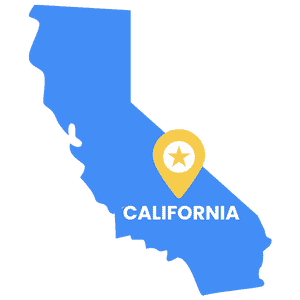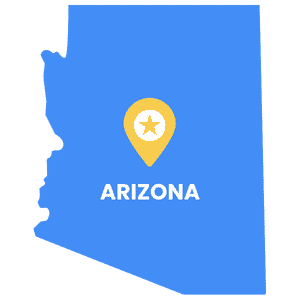California State Information Page
Current Legality State – California
Fully Legal
- Medical marijuana and recreational cannabis use are legalized.
- Decriminalized statewide for personal use in all cities and counties
- Possession of 28.5 grams of usable weed is allowed under California law
- Eight grams of concentrated cannabis are acceptable for adults.
- The cultivation of six marijuana plants is allowed for personal use.

Current Legality State
Fully Legal

- Medical marijuana and recreational cannabis use are legalized.
- Decriminalized statewide for personal use in all cities and counties
- Possession of 28.5 grams of usable weed is allowed under California law
- Eight grams of concentrated cannabis are acceptable for adults.
- The cultivation of six marijuana plants is allowed for personal use.
Medical Cannabis Savings
Taxes explained and the benefits of getting your medical card in Arizona
Recreational Marijuana Taxes in California
23.25% and up (15% excise tax + 7.25% sales tax + 1% local tax, before additional municipal taxes up to an additional 15%)
Medical Marijuana Taxes in California
15% excise tax + municipal taxes
Your cannabis AI assistant
Tailored recommendations for your favorite
Sign up below for early access
*By signing up, you agree to the Terms and Conditions and Privacy Policy.
California residents, see our CA Privacy Notice.
Is Cannabis Legal In California ?
Marijuana has been legal for recreational use for California residents since 2016, and medical marijuana laws have been updated to legalize medical cannabis since 1996 for medical marijuana cardholders and primary caregivers.
California NORML and the state legislature have kept the state well ahead of marijuana use legalization on a federal level.
State Laws and Offenses
Here’s a list of penalties for California’s possession, sale, and distribution of marijuana, concentrated cannabis, or paraphernalia.
- Marijuana is a Schedule I substance in the state of California
- Under federal law, cannabis is still considered a Schedule I Controlled Substance according to the federal government and the Controlled Substances Act.
- Unlike federal drug laws, the Adult Use Marijuana Act permits adults who are not participating in the state’s medical cannabis program to grow and possess personal use quantities of cannabis legally.
- Marijuana Possession with intent to distribute or sell cannabis, more than one ounce, is a misdemeanor punishable by six months imprisonment and a fine of 500 USD.
- Monetary transactions involving the sale or delivery of any amount of marijuana by someone who does not possess a state-licensed permit is a misdemeanor punishable by up to six months in jail and a 500 USD fine.
- There is no penalty to possess marijuana paraphernalia in California cities and counties, unlike other federal controlled substances.
- Sale, delivery, possession with intent to sell or transporting marijuana, and manufacture with the intention to deliver or sell marijuana paraphernalia is a misdemeanor punishable by up to 180 days imprisonment and a fine of up to 500 USD.
Find California Dispensaries Nearby Find Dispensaries Connect With A Doctor
California Qualifying Conditions For Medical Marijuana
California allows patients to seek medical marijuana with a registered card for treating debilitating conditions, including:
- Acquired immune deficiency syndrome (AIDS)
- Anorexia
- Arthritis
- Cachexia
- Cancer
- Chronic pain
- Glaucoma
- Migraine
- Persistent muscle spasms, including, but not limited to, spasms associated with multiple sclerosis
- Seizures include, but are not limited to, seizures associated with epilepsy
- Severe nausea
Due to the Compassionate Use Act, according to state laws medical use is allowed for any other chronic or persistent medical symptom that either:
- Substantially limits the ability of the person to conduct one or more major life activities as defined in the federal Americans with Disabilities Act of 1990 (Public Law 101-336).
- If not alleviated, it may cause serious harm to the patient’s safety or physical or mental health.
- “Written documentation” means accurate reproductions of those portions of a patient’s medical records that have been created by the attending physician, that contain the information required by paragraph (2) of subdivision (a) of Section 11362.715, and that the patient may submit as part of an application for an identification card.
Does California accept out-of-state medical cards?
California marijuana laws do not accept out-of-state medical cards due to public health concerns, but an adult medical patient can visit legal cannabis dispensaries to purchase with an ID for recreational purposes.
When does my California medical card expire?
Medical cards expire one year from the date the patient completes the registration process with the state.
Get a California Medical Marijuana Card
California marijuana DUI laws
Here are the penalties in California for driving under the influence:
- The first criminal offense results in ninety-six hours to six months in county jail, up to 1,000 USD fine, four-month suspended license; the offender must complete a DUI program at the person’s cost, 125 USD license reissue fee, and installation of IID.
- The second offense results in a criminal record with ninety days to one year in county jail, up to 1,000 USD fine, two-year suspended license; the offender must complete a DUI program.
California marijuana growing laws
The state of California allows adult recreational and medical users as well as primary caregivers to grow six plants of medical or recreational weed per residence. Sales remain illegal for homegrown cannabis plants.
California public consumption laws
In California, It is illegal to ingest cannabis, smoke, eat, or vape recreational marijuana in a public space, including but not limited to:
- Parks
- Sidewalks
- Business areas
- Residential areas
- Bars and restaurants
California city specific laws
The laws listed here are for the state. Cities, counties, schools, universities, and employers may set their own rules and consequences. Be sure to check how marijuana laws differ in each county or town before you use.
How to get a medical marijuana card in California
These are the steps to getting a medical marijuana card with the help of Leafy DOC
-
Book An Appointment
- You will schedule an appointment to see a medical marijuana doctor in California at a time that is most convenient for you. Provide basic medical history and book your appointment with a licensed medical marijuana doctor.
-
Evaluation
- Consult with a doctor for a quick evaluation of your ailments, and ask any questions you may have about medical marijuana treatment.
-
Approval
- Within 24 hours after the evaluation, the doctor will send your certificate via email for your recommendation for medical marijuana.
-
State Registration
- After receiving that recommendation, you can then apply with the state of California to complete the registration process by submitting your application with the state together with the doctor’s certificate.

Book your appointment
- Easily make appointment online
- Skip unnecessary doctor office visits
- Provide basic medical history

Match with a Doctor
- Connect w/ the right doctor for you.
- Thorough evaluation via phone or video call.
- Provider will answer any questions.

Get your Medical Card
- Upon Approval you’ll receive confirmation email
- Receive a temporary card or card in the mail
- Enjoy the benefits of being a medical card holder!
Cannabis Policy Reform Timeline
1972: The nation’s first marijuana legalization initiative was created and failed due to pushback from federal authorities and federal prosecutors.
1975: Cannabis was decriminalized under SB95 or the Moscone Act
1996: Medical marijuana Program act legalized medical cannabis for patients with qualifying conditions
2016: Local governments legalized adult-use cannabis for all residents over 21 years old
2021: Due to a safety act, the Department of Cannabis Control was formed by combining three state departments, and an adult-use cannabis regulation and marijuana control board was established.
2022: Efforts are being made under the Marijuana Policy Project to update and improve both recreational and medical programs for legal marijuana.
The above proposal is to help cannabis businesses continue to successfully sell cannabis products within the legal market and to establish a blanket business and professions code to sell and purchase marijuana.
Some of the Current Cannabis Bills in California
- CA AB634 – Controlled substances: tianeptine.
- CA SB378 – Online marketplaces: illicit cannabis: reporting and liability.
- CA AB564 – Cannabis: excise tax: rate increase repeal.









